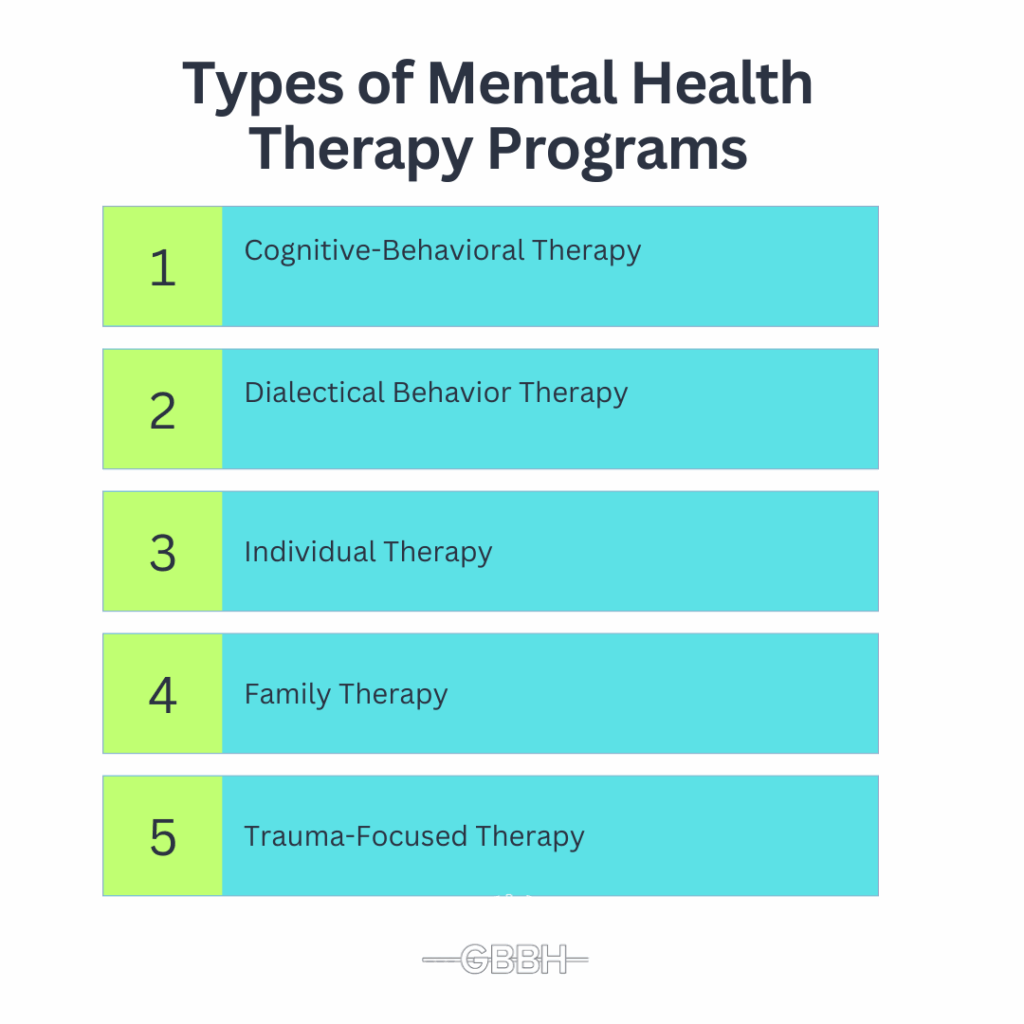Mental health is extremely important when it comes to our mental health. When we face challenges like anxiety, depression, or stress, finding the right treatment is essential for lasting change. In this blog post, we’ll explore how CBT can create positive, long-term changes and how mental health programs can make a difference in your life.
What is Cognitive-Behavioral Therapy?
Cognitive-Behavioral Therapy (CBT) is a type of mental health therapy program that focuses on the relationship between our thoughts, feelings, and behaviors. Developed in the 1960s, CBT helps people identify and change negative thinking patterns and behaviors that contribute to their mental health issues. Unlike some other forms of therapy that delve deeply into past experiences, CBT is usually more focused on the present and developing practical skills to handle everyday challenges.
How CBT Works for Mental Health
When a person experiences negative thoughts, it can lead to harmful feelings and actions. By working with a therapist, individuals learn to recognize these patterns and replace negative thoughts with positive, constructive ones. This process can significantly improve a person’s mental health and help them gain control over their life.
Example: Changing Negative Thought Patterns
Imagine someone who experiences social anxiety. They might think, “People will judge me if I speak up.” This thought could lead to feelings of fear and avoidance of social situations. In a CBT session, a therapist would help the person challenge this belief by asking, “What evidence do you have that people will judge you?” Over time, the person learns to replace the negative thought with a more balanced one, like “I can’t control what people think, but I can choose to engage confidently.” This change in thinking helps reduce anxiety and encourages healthier behaviors.
How Does CBT Work?
CBT operates on the principle that by identifying and challenging unhelpful thoughts and beliefs, individuals can learn to manage their emotions and behavior more effectively. The therapy involves several key techniques:
- Cognitive Restructuring: This technique helps individuals recognize and reframe negative thinking patterns.
- Behavioral Activation: This involves increasing engagement in positive and rewarding activities to counteract depression and low motivation.
- Exposure Therapy: A method used to gradually expose individuals to feared situations, helping them build coping skills and reduce avoidance behaviors.
CBT and Other Therapies: A Complementary Approach
While CBT is a powerful tool, it is often most effective when combined with other therapeutic approaches. For instance, Dialectical Behavior Therapy (DBT), a specialized form of CBT, focuses on helping individuals with emotion regulation and interpersonal effectiveness. At Greater Boston Behavioral Health, we integrate both CBT and DBT within our Mental Health Therapy Program to provide a comprehensive and tailored approach to treatment.
Types of Mental Health Therapy Programs
CBT is often a core part of many mental health therapy programs, including Intensive Outpatient Programs (IOP) and Outpatient Programs. These programs provide structured support to help individuals manage their mental health in a way that fits their needs and lifestyles.
Intensive Outpatient Programs
An Intensive Outpatient Program (IOP) is a treatment option for those who need more support than traditional outpatient care but do not require full hospitalization. An IOP typically involves several therapy sessions each week, where patients engage in individual and group CBT sessions. This program is ideal for individuals who need a higher level of care while still maintaining their daily routines, such as work or school. Mental health treatment centers in Massachusetts often offer IOPs tailored to different needs, providing comprehensive support and therapy.
Outpatient Programs
These programs are flexible and allow participants to attend therapy sessions while continuing with their regular activities. Outpatient Programs commonly include weekly CBT sessions, either one-on-one or in a group setting. These programs are beneficial for those who want to maintain their daily responsibilities while receiving the necessary mental health support.
Benefits of Cognitive-Behavioral Therapy
Here are some key benefits:
- Personalized Approach: CBT is tailored to each person’s specific needs, which makes it highly effective. Therapists work closely with clients to address their unique challenges, ensuring that the therapy is relevant and focused.
- Skills for Life: CBT teaches practical skills that can be used long after therapy ends. Techniques learned during therapy can be applied to everyday situations, helping individuals cope with future challenges.
Finding the Right Mental Health Treatment Center
If you or a loved one are considering CBT, it is essential to find the right mental health treatment center. Many centers in Massachusetts offer a range of mental health therapy programs, including both IOPs and outpatient options. These programs provide professional guidance and support to help you make the most of CBT.
Making the First Step Toward Change
Taking the first step toward mental health treatment can be daunting, but it is an important move toward a healthier and more fulfilling life. By choosing a mental health treatment center that offers CBT as part of its Intensive Outpatient Program or Outpatient Program, you can access a proven, effective method for achieving lasting change.
Why Choose Greater Boston Behavioral Health?
Our Mental Health Treatment Center in Massachusetts is dedicated to offering personalized care through evidence-based therapies. Our Mental Health Treatment Program is designed to meet the unique needs of each individual, incorporating Cognitive-Behavioral Therapy and other therapeutic modalities to support long-term recovery and well-being.
If you or a loved one is struggling with mental health challenges, we encourage you to reach out to our team. At Greater Boston Behavioral Health, we are committed to guiding you on your path to lasting change and a healthier, more fulfilling life.
For more information about our Mental Health Therapy Program and how Cognitive-Behavioral Therapy can make a difference, please contact us today Call us today at (888)278-0716 to begin healing today.
Conclusion
Whether through an Intensive Outpatient Program or a standard Outpatient Program, CBT offers practical, long-lasting solutions to manage mental health challenges. If you are ready to take control of your mental well-being, consider exploring mental health programs that incorporate CBT. With the right support, you can harness the power of CBT to achieve lasting change.
Frequently Asked Questions about Cognitive-Behavioral Therapy
How does CBT fit into a Mental Health Treatment Program?
CBT is a key component of many Mental Health Treatment Programs, including those offered at our Mental Health Treatment Center. It is used to address a range of issues such as depression, anxiety, and stress by helping individuals modify unhelpful thought patterns and behaviors. CBT can be integrated with other therapies, such as Dialectical Behavior Therapy (DBT), to create a comprehensive approach to mental health.
What types of issues can CBT help with?
CBT is effective for treating a wide range of issues, including:
- Depression: Helps address negative thought patterns and improve mood.
- Anxiety: Assists in managing anxiety symptoms and reducing worry.
- Stress: Provides strategies for managing and reducing stress.
- Phobias: Assists in overcoming specific fears and anxieties.
How long does CBT take to be effective?
The duration of CBT can vary depending on individual needs and the complexity of the issues being addressed. Typically, CBT involves a series of sessions over a few weeks or months. Progress is often noticeable within a few sessions, but long-term benefits continue as individuals apply the skills learned in therapy.
Is CBT the same as Dialectical Behavior Therapy (DBT)?
While both CBT and DBT share some similarities, such as their focus on modifying thought patterns and behaviors, they are distinct therapies. DBT, a specialized form of CBT, includes additional techniques for managing emotions and improving interpersonal effectiveness. At Greater Boston Behavioral Health, we may integrate both CBT and DBT into our Mental Health Therapy Program to provide a well-rounded approach to treatment.


